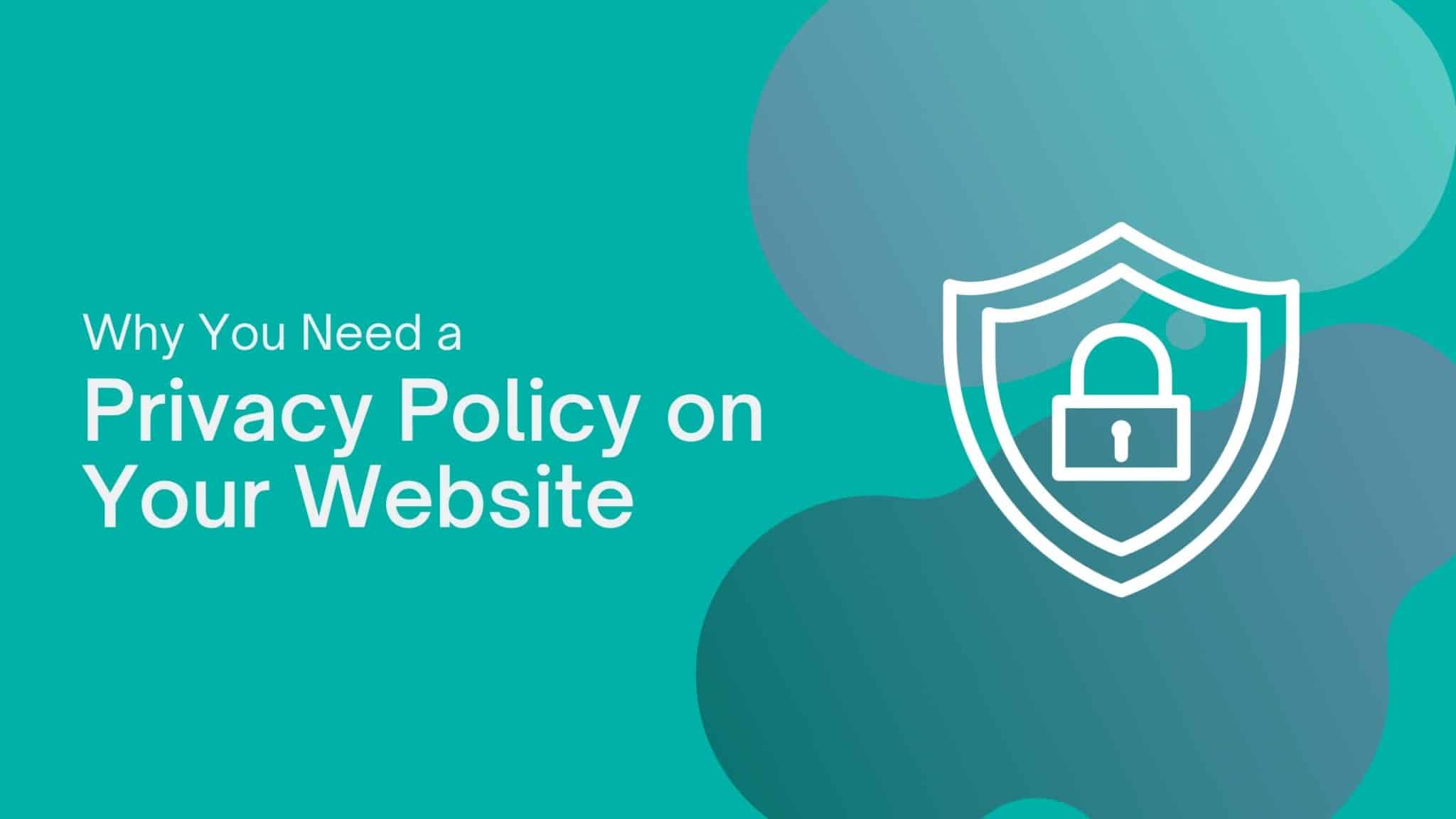Privacy policies often seem like background noise — dry, legal text that most people skip over without a second glance. But the truth is, they matter a lot more than most website owners realize.
In fact, people usually don’t pay attention to privacy policies at all… until something goes wrong. It’s a common misconception that only large corporations need to worry about them.
But the moment you start collecting any kind of data, whether it’s through a contact form, a newsletter signup, or even basic analytics, you’re taking on responsibilities. And with those responsibilities comes the need for transparency.
If you’ve been putting it off or think it doesn’t apply to you, now’s the time to take a closer look.
In this article, we’ll break down why a privacy policy is far more than just a legal formality. It’s a vital part of running a trustworthy, credible website that respects your visitors’ rights and keeps you on the right side of the law.

What Is a Privacy Policy?
A privacy policy is a written notice that tells users what personal data you collect, how you use it, who you share it with, and how you keep it secure. It’s essentially a behind-the-scenes look at how your website handles user information.
Whether someone’s signing up for a newsletter, submitting a contact form, or just browsing your pages, they deserve to know what’s happening with their data. And that’s exactly what a privacy policy is for — it gives people a clear, honest breakdown of what you’re doing with the information they leave behind.
Why It Matters
It’s not just about covering yourself legally (though that’s part of it). A clear privacy policy helps build trust with your users. It shows you’re upfront about how their information is handled.
It also sets expectations, which makes people more comfortable interacting with your site. Think of it as a signal of professionalism and credibility — something users increasingly look for before they engage.
What Counts As Personal Data
You might be collecting more personal data than you realize. If your website includes any of the following, you’re collecting data:
- Names or email addresses from contact or signup forms
- Analytics tools like Google Analytics or Hotjar
- Email marketing platforms like Mailchimp
- Embedded third-party services like YouTube, Stripe, or Facebook Pixels
Yes, even something as basic as tracking visitor stats can qualify.
Most websites today collect data (even if you don’t think they do).
Even if your site is just a portfolio, blog, or landing page, chances are you’re still collecting some form of personal data. Got a newsletter signup? That’s data. Tracking how many people visit your site? Also data. Using a contact form plugin? Yep, still data.

Bottom line: if people can interact with your site in any way, you need to be clear about what happens to their information.
Here are 4 reasons why you need a privacy policy on your website:
1. It’s Not Optional — It’s Required by the Law in Many Places
These days, having one isn’t just a good idea; it’s the law in many parts of the world. And yes, that applies to personal blogs, portfolio sites, and tiny online shops, not just giant corporations.
Let’s take a quick look at some of the biggest privacy laws out there right now:
- GDPR (General Data Protection Regulation – Europe): It applies to any website that gets visitors from the EU, even if you’re based in another country. GDPR requires you to be upfront about the personal data you collect, how you use it, and who you share it with. You also need to get clear, informed consent before collecting that data.
- CCPA/CPRA (California Consumer Privacy Act / California Privacy Rights Act): These laws give California residents strong rights when it comes to their data, including the ability to access, delete, or opt out of the sale of their information. If you run a site that gets US traffic, you’re probably expected to comply.
- Other countries are following suit: Australia, Canada, Brazil, South Korea, South Africa, and more have introduced or are drafting similar rules. Many of these laws mirror the GDPR in terms of requiring transparency and giving users control over their data.
Does This Apply to You?
Almost certainly.
You don’t have to be based in the EU or California to fall under these laws. What matters is who visits your site. If someone from Europe lands on your blog post, or someone from California fills out your contact form, that’s enough to trigger legal obligations.
Ask yourself:
- Do you collect names, emails, or phone numbers via a form?
- Do you use any kind of analytics (like Google Analytics)?
- Are you running ads or using marketing platforms like Facebook Pixel, Mailchimp, or HubSpot?
- Do people from outside your local area visit your site?
If you answered yes to any of those (and most sites will), you should assume that privacy laws apply to you.
What Happens if You Don’t Comply?
Here are the consequences you could face:
- Fines and penalties: Even small websites have been fined for non-compliance. Some GDPR penalties have reached into the millions, though many smaller violations get warnings or smaller fines first.
- Legal complaints: Users can file complaints if they think their data is being mishandled, and in many cases, regulators are obligated to investigate.
- Blocked access: In some regions, non-compliant sites can be geo-blocked or blacklisted from search engines or ad platforms.
- Reputational damage: Once your audience learns that you’re careless with their data, or worse, hiding what you do with it, it’s hard to win back their trust.
2. Trust Factor: You Want Visitors to Feel Safe
You wouldn’t hand over your personal info to a stranger on the street, right? Well, your website visitors feel the same way.
If you’re asking for names, emails, or even just tracking cookies, people want to know that their data isn’t being sold off to the highest bidder, or worse. A solid privacy policy is your way of saying, “Hey, you’re safe here.”
Here’s how:
It Builds Credibility
Let’s be real: most people aren’t combing through your privacy policy line by line. But even if no one reads your privacy policy from top to bottom, just having it there, in plain sight, instantly adds legitimacy.
It shows you’re not just another sketchy site trying to scrape data and disappear. Especially if you’re a small or growing business, this little detail can make a big difference. It shows you’re operating above board, and that kind of transparency earns trust and referrals.
User Expectations Are Changing
Online habits are evolving. People don’t just visit websites anymore; they evaluate them. With so many news stories about hacks, leaks, and companies abusing user data, they are way more protective than they used to be.
Users are starting to expect websites to be upfront about how data is handled. Therefore, a missing or vague privacy policy sends the wrong signal.
On the other hand, a clear and easy-to-find privacy policy proves you respect that expectation. It sets you apart from fly-by-night operations that don’t bother. And in today’s internet, that kind of respect for your users’ privacy is a competitive edge.
When visitors feel safe, they stick around longer, they sign up, and they come back. That’s the trust factor at work.
3. It Protects You As Well
A lot of people think a privacy policy is just for the user’s benefit, but it’s a smart move for you, too.
Prepares You for the Worst
Let’s say there’s a data breach. Or a customer accuses you of mishandling their information. Or maybe a regulator starts asking tough questions. If you don’t have anything in writing about how you handle data, you’re suddenly in a very vulnerable position.
But if you do have a clear privacy policy? That becomes part of your defense. It shows you weren’t being careless — you had a plan, a structure, and a commitment to transparency. That can make a big difference in how a situation plays out.
Prevents Misunderstandings
Miscommunication is a common cause of conflict. Someone assumes you’re selling their data. Someone else didn’t realize you were collecting email addresses for marketing. That kind of confusion can lead to angry emails, bad reviews, or even public callouts.
But a privacy policy lays everything out in black and white. It says, “Here’s exactly what we collect, here’s what we do with it, and here’s how you can opt out.” You’re not just being transparent—you’re proactively avoiding conflicts down the line.
Shows You’re Playing by the Rules
Having a privacy policy isn’t just about dodging problems; it’s about looking professional. If you’re ever trying to land a partnership, advertise on a new platform, or go after bigger clients, people will look at how you handle user data.
And if you have a clear, well-written policy in place, it tells them you’re not just winging it — you’re serious, responsible, and trustworthy. Even regulators are more likely to treat you fairly if you can show you’ve made an honest effort to follow the rules.
4. Search Engines and Other Platforms Expect It
Search engines and major platforms don’t just look at your site’s content; they also look for signs that your site is trustworthy. One basic way to show credibility, especially if you collect user data, is by including a privacy policy.
Ad Platforms and Payment Tools
If you’re planning to run ads through platforms like Google Ads or Facebook Ads, a privacy policy is mandatory. These companies need to see that you’re informing users about how their data is collected and used.
Without one, your campaigns can get denied before they even launch. It doesn’t stop there. Payment processors like Stripe, PayPal, and many e-commerce platforms (think Shopify, WooCommerce, etc.) often require a privacy policy as well.
No policy, no payment flow. That could mean frozen funds or rejected applications, and that’s the kind of problem that can grind your online business to a halt.
SEO and Trust Signals
Google wants to rank trustworthy websites. Having a privacy policy is one of those quiet trust signals that tells both search engines and visitors, “This site takes things seriously.”
It shows that you care about transparency and data responsibility — two things Google increasingly values in search rankings. Skip it, and you risk being seen as sketchy or incomplete.
Even if you’re not running ads right now or using third-party payment tools, not having a privacy policy can put a ceiling on what your site can do later. That means lower rankings, fewer customers, and slower growth — all because of a missing page.
In other words: no privacy policy = less credibility = less reach. And while it might not hit you immediately, it absolutely will catch up to you.

Why So Many Small Businesses Often Miss a Privacy Policy
It’s surprisingly common for small businesses to launch a website without a privacy policy — and it’s not because they don’t care about user data. In most cases, they just don’t realize they need one.
Here’s why that happens more often than you’d think:
DIY Builders Don’t Help Much
Website builders like Wix, Squarespace, and Shopify are built for speed and simplicity. They make it incredibly easy to drag, drop, and publish your site in a weekend. But legal compliance? That’s not their strong suit.
Most of these platforms don’t include a privacy policy by default. And if they do, it’s usually a vague, generic template that doesn’t reflect your actual data practices, and that can do more harm than good.
With no real explanation of what data you’re collecting, how it’s used, or whether it’s being shared, it offers zero protection for you or your visitors.
Agencies Often Don’t Include One
You’d think hiring a web design agency would always cover all the bases, but privacy policies are usually left out. Some agencies don’t want the liability of drafting legal content. Others assume it’s something you’ll take care of yourself.
The result? You end up with a beautiful site that’s missing a legally required document.
And most business owners don’t realize it until they’re asked about it by a customer, flagged by a regulator, or trying to run paid ads and get blocked by compliance rules. It’s an invisible checkbox that can quietly cause big problems down the line.
This Is Where ShiftWeb Has Your Back
Here’s the thing: We know you didn’t start your business to become a privacy policy expert. And honestly, you don’t have to be.
That’s why at ShiftWeb, we’ve made it a no-brainer.
We Include a Privacy Policy With Every Site
Every website we build includes a privacy policy — no exceptions, no extra fees. We treat it like a non-negotiable, just like mobile responsiveness or site security.
A privacy policy isn’t an optional add-on or a fancy upsell; it’s simply part of building a professional, trustworthy website. We handle it for you, so you don’t have to waste time copying a half-baked template from the internet or hiring an expensive attorney just to cover the basics.

Why This Matters
You get peace of mind without lifting a finger. Your visitors know their data is respected, which builds trust. And your website instantly looks more polished and legit.
It’s a small touch with a big impact. Most DIY site builders and even agencies leave you to figure this stuff out on your own, but we don’t think that’s right. At ShiftWeb, we sweat the details, so you don’t have to.
What Should a Good Privacy Policy Include?
- What data you collect: Be upfront about the kind of information your site gathers. This could include form submissions (like contact forms), analytics data (from tools like Google Analytics), and cookies that track user behavior.
- Why you collect it: Tell users the purpose. Are you using their data to respond to inquiries, send newsletters, or improve their browsing experience? Be specific.
- Who you share it with: If you use third-party tools or services (like email platforms or analytics providers), your visitors should know. It builds trust when you’re open about your partnerships.
- How you store and protect the data: Users want to feel safe. Briefly explain the measures you take to keep their information secure, whether that’s encryption, access restrictions, or secure hosting.
- Users’ rights: Let people know they’re in control. Can they access their data? Opt out of emails? Request deletion? Include the steps they can take.
- Your contact info: If someone has a privacy concern or question, they should be able to reach you easily. A dedicated email or form link works well here.
- Other useful details: It’s a bonus to mention things like how long you keep user data, if you use third-party cookies, whether services like Facebook Pixel are active, and how often your policy is reviewed or updated.
- Keep it clear and honest: You don’t need to write a novel. Just tell users what’s happening with their data in a way that’s easy to understand. A clean, honest privacy policy makes a great first impression and keeps you legally covered, too.

Common Mistakes to Avoid
Here are some common missteps that could cost you more than just your credibility:
1. Copying Someone Else’s Privacy Policy
It might seem like a quick fix, but grabbing another company’s policy and slapping it on your site can seriously backfire. Their business practices aren’t yours, and if a visitor or regulator notices inconsistencies, you could be held accountable for promises you’re not actually keeping.
2. Using Outdated Templates That Don’t Reflect What You Actually Do
There are tons of free privacy policy generators out there, but many spit out generic language that doesn’t match your site’s real behavior. If you’re collecting emails, running analytics, or using third-party tools, your policy should spell that out clearly.
3. Burying It in Your Footer — Or Writing It in Lawyer-Speak
If your visitors have to hunt for your privacy policy or can’t understand what it says, it’s basically useless. Be upfront, easy to find, and write in plain language. Think of it as a conversation with your users, not a courtroom defense.
4. Forgetting to Update It When Your Site Evolves
Add a new newsletter signup? Start running Facebook ads with tracking pixels? Your privacy policy should reflect those changes. If it doesn’t, you’re misleading users, whether you mean to or not.

Final Thoughts
A privacy policy isn’t just a checkbox; it’s a sign that you take your business (and your visitors) seriously. It builds trust, shows professionalism, and helps you stay on the right side of the law.
Best part? If you’re building with ShiftWeb, it’s already handled. We bake it right in, so you can spend more time growing your business and less time stressing over fine print.
Ready for a website that doesn’t cut corners?
Let’s build you something sleek and compliant — privacy policy included. Contact us today or check out our affordable website templates to get started.




